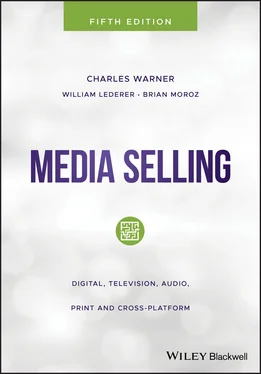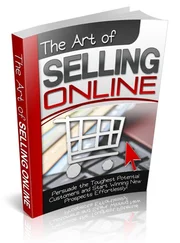Advertising is a vital part of the nation’s economy, and as the nation’s population increases and products proliferate, marketers and their ad agencies will invest more and more in media advertising, especially in the digital media, to influence consumers and to introduce new products and services to highly fragmented media audiences. Therefore, media salespeople must understand the complexities and technologies that create and distribute advertising in order to effectively sell it. You will find out more about how advertising works in Chapter 16, and in that chapter and other chapters that follow, we will try to help you navigate through the maze of those complexities and technologies.
Advertising is one of the integral elements of the marketing process. We might look at advertising as the mass selling of a product. Where is advertising seen or heard? In the media. For the purposes of this book, as mentioned earlier in this chapter, the authors will define the media as businesses that are wholly or in part supported by advertising, e.g. Google, Facebook, ABC, CBS, FOX, NBC, ESPN, CNN, iHeart Media (radio), The New York Times , Cosmopolitan , the New Yorker , and BuzzFeed.
When people talk about the media, they are typically referring to the distributors of news and entertainment content – digital media such as Google and Facebook, plus television, newspapers, radio, magazines, and podcasts. The vast majority of media businesses are dependent in full or in part on advertising, and advertising, as an integral part of a larger marketing system, is co‐dependent on the media. Without the media to reach large numbers of consumers with advertising, marketers would have to go door‐to‐door to try to sell their goods one‐on‐one through personal selling and, similarly, consumers would have to wander from store to store or website to website wondering which sold the product they needed – both very expensive and time‐consuming undertakings. Advertising agencies would not exist if there were no media to distribute the ads they create.
The reason marketers and advertisers are dependent on the media is because the media are pervasive and popular with consumers (users, viewers, readers, listeners), and the media are consumers’ link to the global village. People love their media and depend on their media – their favorite search engine, such as Google; their favorite social media platforms, such as Facebook or Instagram; their favorite television program, such as “Empire;” their favorite magazine, such as People ; their favorite country music radio station; or their favorite newspaper, like the Wall Street Journal . Because of this affection and dependency, the media are actually the most powerful businesses in the country –more powerful than the celebrities, industries, or politicians they cover, expose, and glorify.
It is because of this enormous power coupled with a perception that the media emphasize negative news, poor‐quality user‐generated video, fake news, or sex and violence that many people probably have such a low opinion of the media. Americans seem to blame most of the ills of society on “the media,” by which they typically mean the news media. It is for this reason that we have devoted a separate chapter in this book to ethics. Chapter 3emphasizes the importance for media salespeople to deal with customers ethically, because the reputation of the media is at stake, and that reputation needs to be improved.
One of the roles of the media is to expose consumers to advertising, not to guarantee sales or results to advertisers. The media are just that – a medium, a connection between advertisers and consumers.
In most of the world’s countries, the media are supported and/or controlled by government; however, most of the media in the United States are kept free from government control and interference because the majority of their revenue consists of advertising. The media from which the American public gets the vast majority of its information and entertainment are free or relatively inexpensive because they are supported by advertising. If Google were not supported by advertising, people would have to pay a few cents for each search. If Facebook were not free, people would have to pay for posting a selfie in a bar with friends.
Finally, in spite of a love‐hate relationship between the public and the media, or perhaps because of it, most large media companies are profitable. Many of the great fortunes in the in the world have been built in the media, especially the digital media, for example Google, Facebook, Amazon, and Snapchat. Even if new products do not survive in the marketplace, the media still receive the advertising dollars invested to introduce a product, just as the media get the advertising revenue from political candidates who eventually lose. The profit margins in successful media companies are, as rule, higher than in many other industries. For example, Facebook’s quarterly profit margins are often higher than 50 percent because it does not pay for content (its supply, which users create), does not pay for operations (producing the content), and does not pay for distribution (it’s on the Internet). Also, top‐rated radio and television stations in major markets often have profit margins of 40 percent or greater.
The reason for these profit margins is because in an advertising‐supported medium such as Google, Facebook, radio, television, digital newspapers, and digital magazines, the cost of adding an additional ad has no or extremely low incremental costs involved. For example, in television, the time for commercials is baked into most programming, so if a commercial is not scheduled in a commercial pod, a promotion or public service announcement will run. A television station does not expand the programming time if it does not have commercials to run. Thus, at a television station, it costs nothing to add a commercial – there are no incremental, or marginal costs involved. On the other hand, if an automotive manufacturer sells a car, it has to build one with all of the incremental, marginal costs involved such as labor, materials, transportation, and so forth. Once a radio or television station or a website has sold enough advertising to cover its cost of operations and debt payment, if any, all additional advertising sold is virtually 100 percent profit. In digital newspapers and digital magazines, which often have an additional subscription revenue stream, once the cost of operating is recovered, the incremental cost of adding an ad is very low in comparison to the cost of the ad to an advertiser.
What this profitable economic model means for salespeople is that advertising revenue can be quite profitable and, therefore, there is more money to distribute to salespeople in the form of compensation than in less profitable industries. Media salespeople are among the highest paid of any industry.
Although media buying and selling functions are being automated by artificial intelligence (AI) and programmatic trading (see Chapter 17), research about jobs in the future indicates that jobs with more emphasis on clerical and service work (selling is service work) and jobs with more emphasis on communications and critical thinking (sales, again) are jobs that are less likely to be eliminated by automation and (AI). Furthermore, strategic media planning and selling‐as‐educating jobs will take on new importance in the future and, thus, are much less likely to be automated or computerized. 31 Chapter 2will cover the concept of media selling as educating, which replaces the traditional practice of selling the inexact “magic” of the media in the pre‐Internet era.
If you agree that advertising is a vital part of the American economy and that advertising supports free Google searches, free Facebook posts, and free broadcast television and local radio programming, then you must believe in the value and efficacy of advertising. If so, then you cannot be hypocritical and use ad‐blocking software. If you are selling advertising in any medium, including a digital medium, you must not only support, embrace, watch, listen to, and read all advertising you are exposed to but also understand enough about advertising to be able to evaluate, appreciate, and intelligently critique all the advertising you see or hear. Ad blocking is not allowed if you are a media salesperson.
Читать дальше












